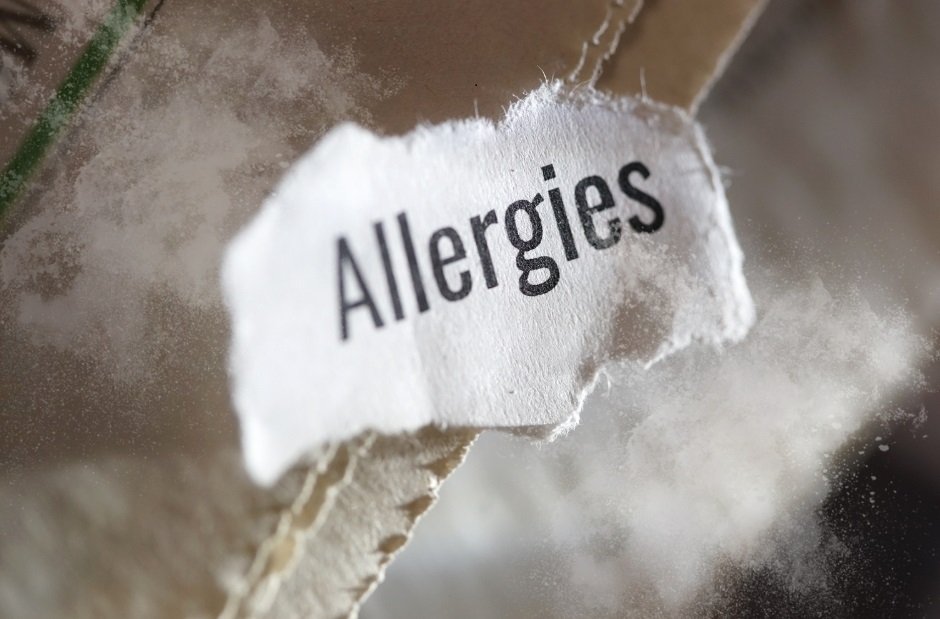Living Well with Allergies: Empowerment, Solutions and a Path to Wellness
Section 1: Understanding Allergies
Definition of Allergies:
Allergies are a result of the immune system’s hypersensitivity to substances that are normally harmless. When the immune system encounters these substances, known as allergens, it reacts by producing antibodies, particularly Immunoglobulin E (IgE). These antibodies trigger the release of histamine and other chemicals, leading to allergy symptoms.
How Allergies Develop:
Allergic reactions typically occur in two stages: sensitization and subsequent exposure. During sensitization, the immune system is exposed to an allergen, and IgE antibodies specific to that allergen are produced. Upon subsequent exposure to the same allergen, these antibodies trigger the release of histamine and other mediators, causing allergic symptoms.
Common Allergens:
Allergens vary widely and can include:
- Pollen: Grains released by trees, grasses, and weeds.
- Dust Mites: Microscopic organisms that thrive in household dust.
- Pet Dander: Skin flakes, fur, or feathers from pets like cats, dogs, or birds.
- Foods: Common allergenic foods include peanuts, tree nuts, shellfish, eggs, milk, wheat, and soy.
- Medications: Certain drugs, such as antibiotics (e.g., penicillin), NSAIDs (e.g., aspirin), and chemotherapy drugs, can cause allergic reactions.
- Insect Stings: Venom from bee, wasp, hornet, or fire ant stings.
Types of Allergies:
- Seasonal Allergies: Also known as hay fever or allergic rhinitis, triggered by airborne pollen from trees, grasses, and weeds during specific seasons.
- Perennial Allergies: Persist year-round and are often triggered by indoor allergens such as dust mites, pet dander, mold, and cockroach droppings.
- Food Allergies: Reactions to specific foods, which can range from mild itching or hives to severe anaphylaxis.
- Drug Allergies: Adverse reactions to medications, including antibiotics, pain relievers, and anesthetics, which can manifest as rashes, swelling, or anaphylaxis.
Allergy Symptoms:
Symptoms of allergies can vary depending on the allergen and the individual’s sensitivity. Common symptoms include:
- Nasal symptoms: Sneezing, runny or stuffy nose, postnasal drip.
- Eye symptoms: Itchy, watery, or red eyes (allergic conjunctivitis).
- Skin symptoms: Itchy rash (urticaria or hives), eczema, swelling (angioedema).
- Respiratory symptoms: Coughing, wheezing, shortness of breath, chest tightness.
- Gastrointestinal symptoms: Nausea, vomiting, diarrhea, abdominal pain.
Allergy Testing:
Several methods are used to diagnose allergies, including:
- Skin Prick Tests: Small amounts of allergens are applied to the skin, and the skin is pricked or scratched to allow the allergen to enter. A reaction indicates sensitivity.
- Blood Tests: Measure levels of specific IgE antibodies to different allergens in the blood (e.g., radioallergosorbent test or RAST).
- Elimination Diets: Temporarily remove suspected allergens from the diet and then systematically reintroduce them to identify triggers.
- Challenge Tests: Under medical supervision, small amounts of allergens are ingested or inhaled to observe reactions.
Section 2: Managing Allergies
Avoidance Strategies:
While complete avoidance of allergens may be challenging, several strategies can help minimize exposure:
- Dust Mite Control: Use allergen-proof covers for mattresses, pillows, and bedding. Wash bedding regularly in hot water.
- Pet Allergies: Keep pets out of bedrooms, bathe pets regularly, and vacuum carpets and upholstery frequently.
- Pollen Allergies: Stay indoors during peak pollen seasons, keep windows closed, and use air conditioning with a HEPA filter.
Medications:
Various medications can help alleviate allergy symptoms:
- Antihistamines: Block the effects of histamine, reducing itching, sneezing, and runny nose. Examples include loratadine, cetirizine, and fexofenadine.
- Decongestants: Relieve nasal congestion by constricting blood vessels in the nasal passages. Available in oral or nasal spray forms (e.g., pseudoephedrine, oxymetazoline).
- Nasal Corticosteroids: Reduce inflammation in the nasal passages, relieving congestion, sneezing, and runny nose. Examples include fluticasone, budesonide, and mometasone.
- Leukotriene Inhibitors: Block the action of leukotrienes, chemicals involved in allergic reactions. Used for allergic rhinitis and asthma (e.g., montelukast).
- Mast Cell Stabilizers: Prevent the release of histamine and other mediators from mast cells. Available as nasal sprays (e.g., cromolyn sodium) or eye drops (e.g., nedocromil).
- Immunomodulators: Modulate the immune response to allergens. Used for severe allergic rhinitis and asthma (e.g., omalizumab).
Immunotherapy:
Immunotherapy aims to desensitize the immune system to allergens and reduce allergic symptoms:
- Allergy Shots (Subcutaneous Immunotherapy, SCIT): Administered by injection, gradually increasing doses of allergens help the immune system build tolerance over time. Effective for allergic rhinitis, allergic conjunctivitis, and insect venom allergies.
- Sublingual Immunotherapy (SLIT): Allergy tablets or drops containing allergen extracts are placed under the tongue and absorbed through the mucous membranes. A convenient and less invasive alternative to allergy shots, particularly for pollen allergies.
Emergency Preparedness:
For individuals with severe allergies, emergency preparedness is crucial:
- Epinephrine Auto-injectors: Prescribed for individuals at risk of anaphylaxis due to food allergies, insect stings, or other triggers. Epinephrine (adrenaline) helps reverse severe allergic reactions by constricting blood vessels and opening airways.
- Anaphylaxis Action Plan: Develop a personalized plan with a healthcare provider outlining steps to take in case of an allergic emergency. Include instructions for using epinephrine, when to seek medical help, and emergency contact information.
Alternative Therapies:
While alternative therapies are sometimes used for allergy relief, their effectiveness is not well-established:
- Acupuncture: Traditional Chinese therapy involving the insertion of thin needles into specific points on the body to rebalance energy flow. Some studies suggest acupuncture may help relieve allergy symptoms, but more research is needed.
- Herbal Remedies: Certain herbs and supplements, such as butterbur, stinging nettle, and quercetin, are purported to have anti-allergic properties. However, scientific evidence supporting their use for allergies is limited, and some may cause adverse reactions or interact with medications.
Section 3: Living with Allergies
Allergies and Quality of Life:
Allergies can significantly impact quality of life by affecting physical health, emotional well-being, and daily activities:
- Sleep Disturbances: Allergic rhinitis and asthma symptoms can disrupt sleep, leading to fatigue and irritability.
- Impaired Work or School Performance: Nasal congestion, headaches, and fatigue may affect concentration, productivity, and academic performance.
- Social Limitations: Allergies can interfere with social activities, travel, and outdoor events, particularly for individuals with severe allergies.
Managing Allergies in Children:
Children with allergies require special attention and care:
- Early Detection and Diagnosis: Recognize allergy symptoms in children, such as nasal congestion, coughing, sneezing, and skin rashes.
- Allergen Avoidance: Create an allergen-free environment at home, school, and daycare by removing triggers like dust mites, pet dander, and food allergens.
- Education and Empowerment: Teach children about their allergies, how to recognize symptoms, and how to use allergy medications (e.g., epinephrine auto-injectors) in case of emergencies.
- Communication with Caregivers: Ensure that teachers, daycare providers, and other caregivers are aware of a child’s allergies and have an emergency action plan in place.
Traveling with Allergies:
Traveling can present unique challenges for individuals with allergies:
- Research and Planning: Research allergen exposure at your destination, including pollen levels, air quality, and food options.
- Packing Essentials: Pack necessary medications, including antihistamines, nasal sprays, inhalers, and epinephrine auto-injectors, in your carry-on luggage.
- Communication: Inform travel companions, tour guides, and hotel staff about your allergies, dietary restrictions, and emergency needs.
- Emergency Preparedness: Carry a medical alert bracelet or necklace indicating your allergies and emergency contact information.
Allergies and Mental Health:
Living with allergies can take a toll on mental health and well-being:
- Stress and Anxiety: Constant worry about allergic reactions, avoidance of triggers, and fear of anaphylaxis can contribute to anxiety and stress.
- Social Isolation: Avoidance of social gatherings, restaurants, or travel due to allergies may lead to feelings of loneliness and isolation.
- Coping Strategies: Develop healthy coping mechanisms to manage stress, such as relaxation techniques, mindfulness, and seeking support from friends, family, or support groups.
Section 4: Future Directions
Research and Developments:
Ongoing research is focused on improving allergy diagnosis, treatment, and prevention:
- Biologic Therapies: Target specific molecules or pathways involved in allergic inflammation, offering more targeted and effective treatment options.
- Vaccines: Investigating novel vaccine approaches, including peptide-based vaccines and DNA vaccines, for allergic diseases such as hay fever and asthma.
- Precision Medicine: Utilizing genetic and molecular profiling to identify personalized allergy triggers and tailor treatment strategies accordingly.
Public Health Initiatives:
Public health efforts aim to raise awareness about allergies and improve access to care:
- Education and Advocacy: Allergy advocacy organizations work to increase public awareness, promote research funding, and advocate for policies that support individuals with allergies.
- School and Workplace Policies: Implementing allergy-friendly policies in schools, workplaces, and public spaces to accommodate individuals with allergies and prevent exposure to allergens.
- Community Support: Providing resources, support groups, and educational programs for individuals and families affected by allergies to promote self-management and improve quality of life.
SUMMARY :
Living with allergies requires a multifaceted approach that includes understanding allergens, managing symptoms, and addressing the impact on daily life and mental well-being. By implementing avoidance strategies, using appropriate medications, and seeking medical care when needed, individuals with allergies can effectively manage their condition and lead fulfilling lives. Continued research and public health efforts are essential to improve allergy diagnosis, treatment, and prevention, ultimately reducing the burden of allergic diseases on individuals and society as a whole. With proper support and resources, individuals can navigate life with allergies with confidence and resilience, focusing on what truly matters: enjoying health, happiness, and meaningful connections with others.












